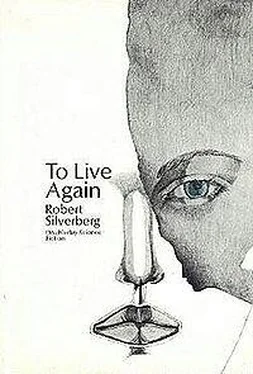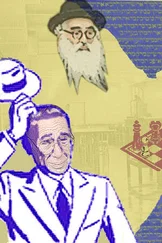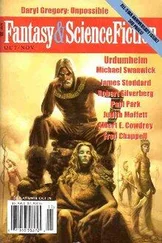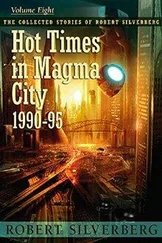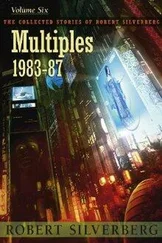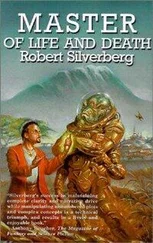He indicated a room where they might change. Within, Roditis stripped away his sweat-stained clothing and gratefully shucked his shoes. His body, at thirty-seven, was tight-muscled and solid, a compact bullet of flesh still traveling unswervingly on its designed trajectory. Noyes, who was no older, still gave the illusion of lanky grace, but it was only an illusion. Beneath his clothes the tall man was thickening at the paunch, going flabby at thigh and rump. Such weakness of the flesh struck Roditis as a symptom of the decay of the will. He judged men harshly in this respect.
Arrayed now in loose, billowing robe and soft sandals, Roditis said, “It’s certainly more comfortable this way. If men were saner they’d dress like this all the time.”
“It wouldn’t be practicable.”
“No,” Roditis agreed. “It leads to undue relaxation. A slackening of striving. Are we supposed to wait here for them to come back and get us?”
“I suppose,” said Noyes. The room was bare of furniture, but for the two saddle-backed benches on which they had left their worldly clothes. The walls were of some dark, highly reflective stone, slabs of black marble, perhaps, or possibly onyx. If onyx could be had in such quantities, Roditis thought. There was an inscription in inlaid letters of gold leaf on each wall. The one facing Roditis said:
If so far you have been deaf to the teaching, listen to it now! An overpowering craving will come over you for the sense-experiences which you remember having had in the past, and which through your lack of sense organs you cannot now have. Your desire for rebirth becomes more and more urgent; it becomes a real torment to you. This desire now racks you; you do not, however, experience it for what it is, but feel it as a deep thirst which parches you as you wander along, harassed, among deserts of burning sands. Whenever you try to take some rest, monstrous forms rise up before you. Some have animal heads on human bodies, others are gigantic birds with huge wings and claws. Their howlings and their whips drive you on, and then a hurricane carries you along, with those demonic beings in hot pursuit. Greatly anxious, you will look for a safe place of refuge.
They read it in silence. Roditis said, “That’s a lot of gold to waste on such nonsense. Recognize it?”
“The Bardo Thцdol, of course.”
“Yes. The good old Book of the Dead, eh? A hot line of revelation straight from the Himalayas?” Noyes pointed to the inscription on the rear wall. “What do you make of that one?”
Roditis turned, narrowing his eyes. It read: He who lacketh discrimination, whose mind is unsteady and whose heart is impure, never reacheth the goal, but is born again. But he who hath discrimination, whose mind is steady and whose heart is pure, reacheth the goal, and having reached it is born no more.
A muscle twitched in Roditis’ cheek. He said bleakly, “It’s pure nirvana-propaganda. Subversion. I thought they didn’t try to push that concept in the Western world.”
“They can’t help allowing a little of the orthodox theory to survive,” Noyes said, sounding apologetic. “Why not? We’ve adapted all that Oriental foolishness to our own purposes. And our own purposes don’t include nirvana at all. To be swallowed up in the cosmic all? To be born no more? That’s not our object at all. To live again, that’s what we want. Again and again and again. So why do they put that up?”
“They pose as the heirs to Eastern mysticism,” said Noyes. “Catering to Western pragmatism. In theory, rebirth is undesirable, freedom from the wheel of existence is the highest goal. Yes?”
“Yes. In theory. Not for me.” A monk entered. “The guru now will see you,” he murmured. Roditis shuffled forward through clouds of incense, his sandals sliding on the smooth stone floor. Over the arch of the door he found another slogan in letters of gold:
It is appointed unto man once to die. Yes, he thought. Once to die: I’ll grant that. But many times to be reborn. He felt the warm presence within him of Anton Kozak and Elio Walsh, who lived again because he had chosen their personae from the soul bank. Had they hungered for nirvana’s sweet oblivion? Of course not! They had bided their time in cold storage, and now they walked the world again, passengers in a busy, well-stocked, active mind. Roditis would leave nirvana to real Buddhists. He preferred the Westernized version of the creed.
The guru looked like a salesman of motel appliances who had seen the light. Not even his shaven skull and saffron robes could conceal the blunt, earthily American features, the jutting jaw, the prominent lips, the glossy, somewhat hyperthyroid blue eyes, the domed vault of the forehead. He was squat of physique, even shorter and stockier than Roditis, and was perhaps sixty years old, though it was difficult to be certain of that. The only creases in the holy man’s face were those of its youthful geography made deeper: the deep valleys alongside the strong nose. His skull, newly mown, was pink and smooth. It had a curious occipital bulge.
Taking Roditis’ hand with his left, Noyes’ with his right, the guru offered a blessing and a wish for many lives for them both. Roditis was reassured. He had no interest in being fobbed off to nirvana while reincarnations were available.
“To my study?” the guru suggested. Hideous Tibetan scrolls defaced the walls. Roditis eyed them with displeasure; within him, Anton Kozak surged with delight, but Elia Walsh, the bluff old philistine, voiced distaste even stronger than Roditis’. There was a desk, and on it a very secularlooking telephone with vision and data-transmitting attachments. Beside the telephone lay a book expensively bound in full morocco. The guru, smiling as he noticed Roditis’ interest in the volume, handed it to him. “A priceless first edition,” said the holy man. “Evans-Wentz, the original translation of the Bardo, 1927. You won’t find many of these about.”
Roditis caressed the book. Its cool binding held a sensual appeal for him. Opening it with care, as though he expected pages to spring free of their own will, he eyed the familiar text with its lengthy burden of prefaces, its endless table of contents. He turned to the first section, the Chikhai Bardo. “HEREIN LIETH THE SETTING-FACE-TO-FACE TO THE REALITY IN THE INTERMEDIATE STATE: THE GREAT DELIVERANCE BY HEARING WHILE ON THE AFTER-DEATH PLANE, FROM THE PROFOUND DOCTRINE OF THE EMANCIPATING OF THE CONSCIOUSNESS BY MEDITATION UPON THE PEACEFUL AND WRATHFUL DEITIES.”
Nonsense, Roditis knew, and Elio Walsh echoed the sharp judgment while Kozak registered mild annoyance. On a different level of his mind Roditis admitted that it was useful nonsense, in its way. How mumbo-jumbo from the icy plateaus of the yak country could be a guide to American man was a complex matter, but so it had befallen, and Roditis, comforted by his multiple personality, was flexible enough to accept and reject in the same moment.
“It’s a beautiful volume,” he said. “A gift from Paul Kaufmann,” the guru replied. “One of his many kindnesses to our establishment. His loss is truly a great one.”
“Luckily, only temporary,” Roditis pointed out. “It can’t be long before a transplant of his persona will be awarded.”
“Quite soon, now, I understand.”
“Oh?” Roditis lurched tensely forward. “What do you know about that?”
The guru looked startled at Roditis’ eagerness. “Why, nothing official. But he has been dead several months now. The family period of mourning is over. Surely they have processed the applicants for Kaufmann’s persona by now, and a decision soon will come. So I assume. I have not been told anything.”
Relaxing, Roditis saw Noyes’ quick glower of disapproval. He knew he had acted in bad form, blurting like that. Too damned bad. Noyes had nicer manners; but Noyes wasn’t hungry for Paul Kaufmann’s persona. Sometimes there was a strategic advantage to a seemingly accidental tipping of your hand. Let the guru know what he wanted. It couldn’t hurt.
Читать дальше
